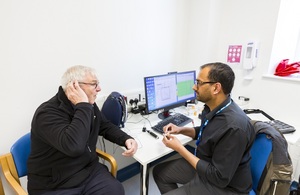- Government acts to fix front door to NHS and deliver more appointments
- Slashing burdensome red tape to boost capacity in surgeries and hire over 1,000 more newly-qualified doctors
- Government listening to sector to help end scandal of patients struggling to see a doctor
More than 1,000 newly qualified GPs will be recruited thanks to government action to remove red tape currently preventing surgeries from hiring doctors.
Bringing back the family doctor is central to the government’s plan to rebuild the health service, and the changes being made to cut through the current rules will help more patients get access to GPs and ensure more GPs are able to find roles, so that people in communities across England will receive the timely care they deserve this year.
Currently, under a scheme known as the Additional Roles Reimbursement Scheme, primary care networks (PCNs) can claim reimbursement for the salaries (and some on-costs) of 17 new roles within the multidisciplinary team – meaning more specialists are available to treat patients.
They are selected to meet the needs of the local population, but are currently prevented from using this to recruit additional GPs. The changes announced today (1 August 2024) mean that newly qualified GPs can quickly be recruited into the NHS through this scheme in 2024 to 2025.
It’s thought hundreds of newly qualified GPs could be without a job this summer in England. But thanks to this intervention, they will be able to be hired by the end of the year.
The government is listening to GPs, and this has been hard fought by the British Medical Association (BMA), the Royal College of General Practitioners and many other groups who petitioned for it, receiving over 11,000 signatures.
It comes as the government accepts recommendations of the pay review bodies in full, increasing GPs’ pay by 6% – their first meaningful pay rise in years.
Health and Social Care Secretary Wes Streeting said:
It is absurd that patients can’t book appointments while GPs can’t find work.
This government is taking immediate action to put GPs to work, so patients can get the care they need.
This is a first step, as we begin the long-term work of shifting the focus of healthcare out of hospitals and into the community, to fix the front door to the NHS.
I want to work with GPs to rebuild our NHS, so it is there for all of us when we need it.
Dr Amanda Doyle, National Director for Primary Care and Community Services, said:
With hard-working GP teams delivering millions more appointments a month compared to before the pandemic, it is vital they are given the resources to manage this increase in demand.
Adding GPs to the scheme is something that the profession has been calling for in recent months to make it easier for practices to hire more staff – so I welcome this measure which is an important first step to increasing GP employment in the long term.
We will continue to work with GPs, the BMA and the government to avert any potential action, but in the meantime the NHS has a duty to plan for any possible disruption to ensure services continue to be provided for patients – so the public should continue to come forward for care in the normal way if collective action does go ahead.
This is an emergency measure for 2024 to 2025 to ensure patients are able to access GPs and GPs are able to find roles, while the government works with the profession to identify longer-term solutions to GP unemployment and general practice sustainability as part of the next fiscal event.
The government will ensure the NHS has the funding it needs to deliver this, paid for by £82 million from the existing department budget.
In expanding general practice capacity, the Additional Roles Reimbursement Scheme improves access for patients, supports the delivery of new services and widens the range of offers available in primary care.


















